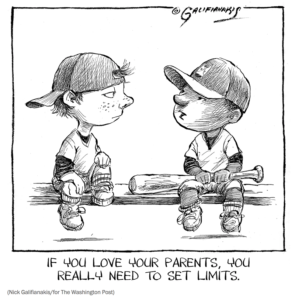
Unhappily Married, Divorcing or Divorced Parents, Set Your Own Boundaries, So Your Kids Aren’t the Ones Who Suffer
I lost a friend once when I was candid with her and said I thought her bashing her husband to her kids and in front of the kids was destructive to them, and if they ever ended up in a divorce, she could lose custody of the kids because of her actions. She got angry, saying, “I am just telling them the truth.” Well, it won’t surprise you to know that they did eventually divorce, and while she and her ex-husband are now getting along better than they ever did, their children have had a host of problems that have plagued them into their adult lives, including depression, anxiety, and abuse of alcohol and drugs. I would venture to guess that the seeds of that self-destructiveness were sown when their mother bad-mouthed their father in front of and to the kids for years while they were still married.
When I see this action of one parent bad-mouthing the other parent to the kids or even just in front of the kids, I know it will not end well.
It has long been known by people in the mental health professions and the legal profession that the conflict itself, whether the couple is still married or are divorced, is what is most destructive for the children. The parent who is doing the bad-mouthing may get some sick pleasure out of trashing their spouse in front of their children, but in the end, it is the kids who are going to suffer the most.
The real irony is that I often see the kids get so tired of the parent who is bad-mouthing their other parent that they align with the parent who was being bashed.
Sometimes even resulting in them having no relationship with the parent who was trashing their other parent! Psychologists will tell you that it is particularly destructive to kids for a parent to do this for a number of reasons, including, 1) the child loves both parents, and it wounds them to have either parent criticized, and 2) the children know they are a part of both parents and so when one parent is being criticized the other parent the child, either consciously or subconsciously, take that criticism as criticism of themselves.
There was an article in the Washington Post back in 2003, entitled, “Don’t Blame the Messenger: Divorced Parents Your Behavior is Wrong,” that gave a chilling account of parents turning their children into the messenger back and forth between the parents, even after the ink on the judge’s signature approving the decree of divorce has dried. If one or both parents turn their children into the messenger between them or bash the other parent they are perpetuating the conflict which is what is so damaging to the children. This is an excuse just to keep the children engaged in the conflict that one or both parents are unable to let go of. Many mental health professionals and now even many judges categorize this as child abuse.
I would love to say that this problem was just a thing of the past and all parents who are in unhappy marriages, getting divorced or are already divorced, have become enlightened about the damage this can do to their children, so they no longer do it, but sadly that is not the case.
In traditional litigated divorces (divorces resolved by a judge in court), this “other parent bashing” continues in far too many cases. In stark contrast, couples who resolve their divorce in the Collaborative Divorce process learn the importance early on of being very careful on how to deliver information to the children and how important it is NOT to say anything bad about their child’s other parent to the child or in front of the child.
Very often, what we see is that couples who are interested in the Collaborative Divorce process are people who are insightful and are already mindful of the importance of being a “united front” with the children. When we begin their Collaborative Divorce, couples often tell us they not yet even told the children, seeking direction and coaching from the professionals who know how to tell the children in a way to make sure the kids know it is not their fault and that the parents still love them and they will still be a family, albeit structured differently. If you are divorcing and you care about the welfare of your children, please consider Collaborative Divorce.











